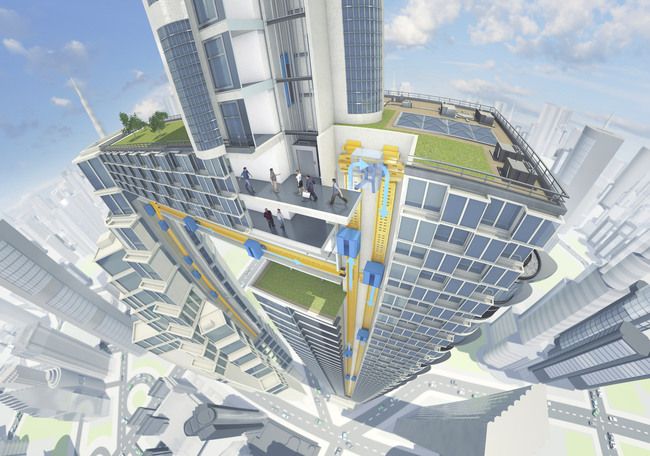
German engineers have invented a cable-less elevator that can move horizontally as well as vertically by using magnetic levitation, or maglev, technology - meaning the elevator carriage will float in mid air as you travel in it.
Developed by technology company ThyssenKrupp, MULTI elevators are the first to adopt an alternative to traditional cables, pioneering the use of electromagnetic suspension technology more commonly associated with super-fast trains that hover above the tracks to reduce friction.
Two separate motors will allow MULTI elevator cabins to travel both horizontally and vertically, while the elevator shaft form a loop so that several cabins can move around the system simultaneously at speeds of 11 miles per hour. Passengers will be able get in or out every 15-30 seconds. "MULTI will transform how people move inside buildings," ThyssenKrupp said.
The first testing will be in Rottweil, Germany in 2016.
According to a spokesperson for ThyssenKrupp, architects have been approaching the company for a decade, looking for a new kind of elevator design. "Traditional elevator systems are constantly battling bottlenecks," the spokesperson told Newsweek. "The answer was either to increase capacity or increase speed. When you increase speed too quickly, the human body reacts. So we decided to increase capacity."
The company predicts that MULTI will result in a 25% increase in office space, 50% increase in transport capacity and reduce power usage by 50%. The use of lightweight materials will also result in structural weight that is 50% less than the average elevator.
According to ThyssenKrupp CEO Andreas Schierenbeck, if all the time New York office workers wait for lifts each year is added together, they spend 16.6 years of time that could otherwise be spent working waiting for the elevator. Almost another six years of working time are spent waiting inside the cabin. "This data provides how imperative it is to increase the availability of elevators," said Schierenbeck.
ThyssenKrupp said: "Using no cables at all, a multi-level brake system, and inductive power transfers from shaft to cabin, MULTI requires smaller shafts than conventional elevators, and can increase a building's usable area by up to 25%."
Engineers placed mechanical brakes and a magnet that is permanently affixed onto the cabin, so even if there's a power outage the passengers are safe, say ThyssenKrupp.
The amount of energy used depends on the number of cabins the elevator has. The higher the building the more cabins and therefore there is more energy. "Traditional elevators use a lot of energy when jolting into motion," the spokesperson said. "That peak of energy doesn't happen with MULTI. Instead, it has a smooth and easy way of consuming energy."
If this all sounds a little dizzying, a television screen will indicate whether the cabin is moving vertically or horizontally to help with balance when riding the elevator. "Just like a landscape moves when you are on the train, the direction the cabin is moving will be simulated on the screen to help with visual orientation."
Because elevator shafts will no longer limited by height with MULTI, height restrictions do not apply to the buildings that house the new-age elevators. They could change the way lifts exist in modern buildings, and even the way the buildings themselves are designed.
Uncommon Knowledge
Newsweek is committed to challenging conventional wisdom and finding connections in the search for common ground.
Newsweek is committed to challenging conventional wisdom and finding connections in the search for common ground.
About the writer
To read how Newsweek uses AI as a newsroom tool, Click here.








